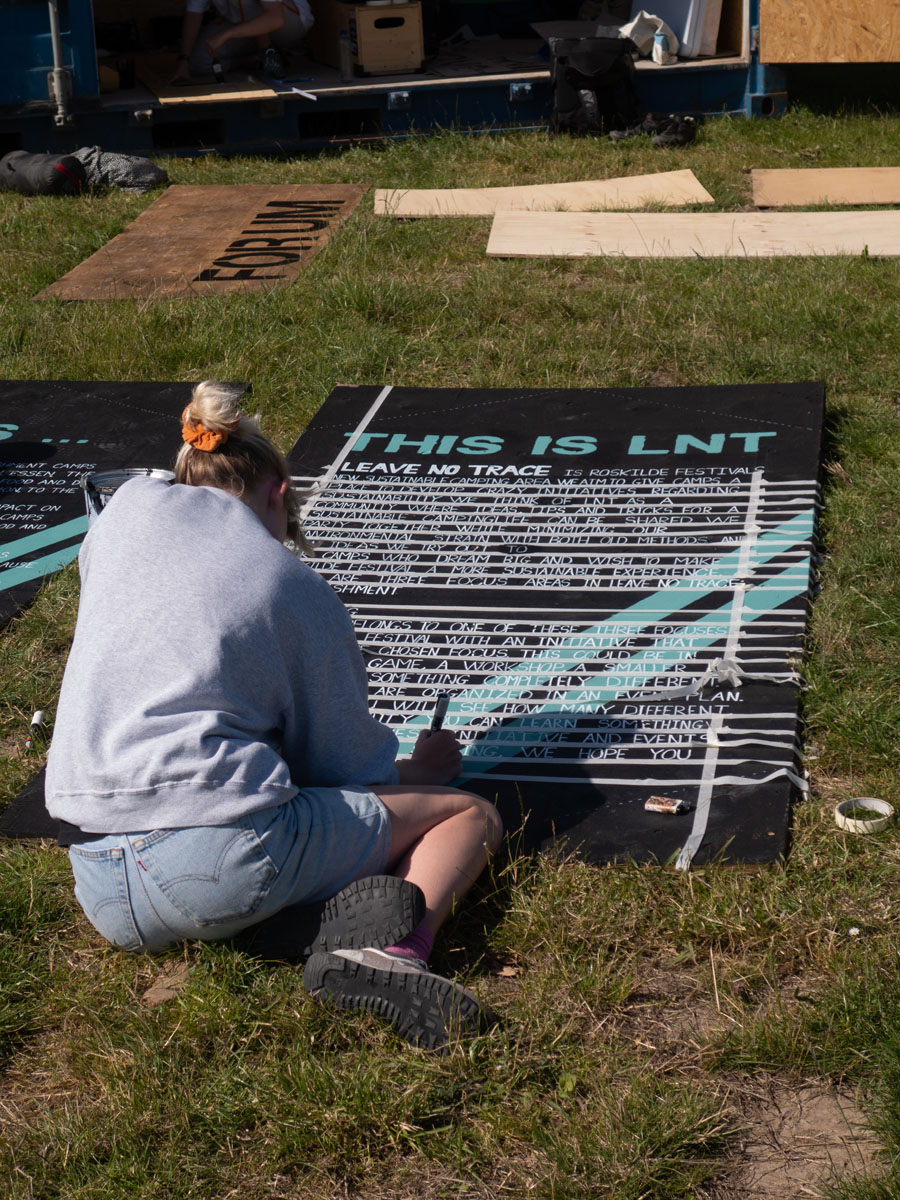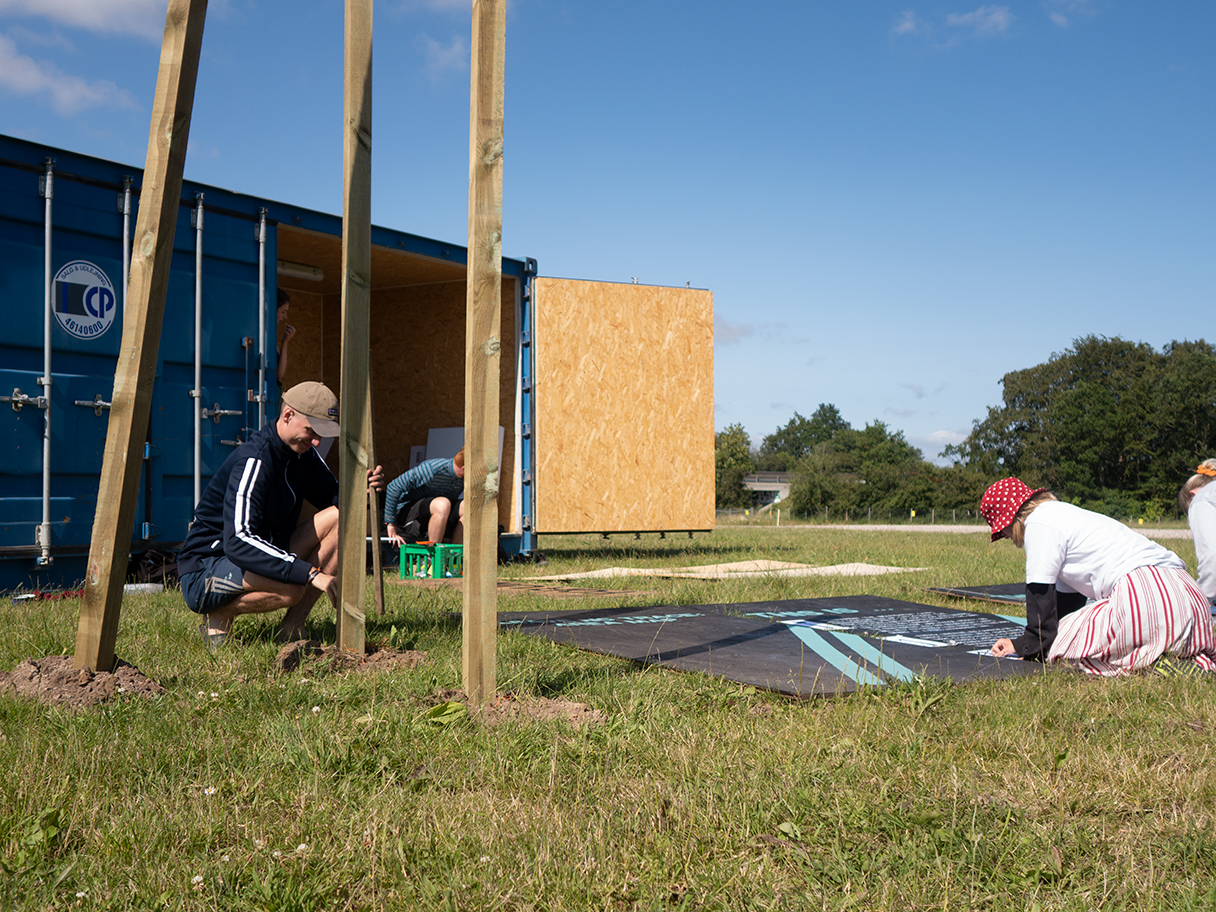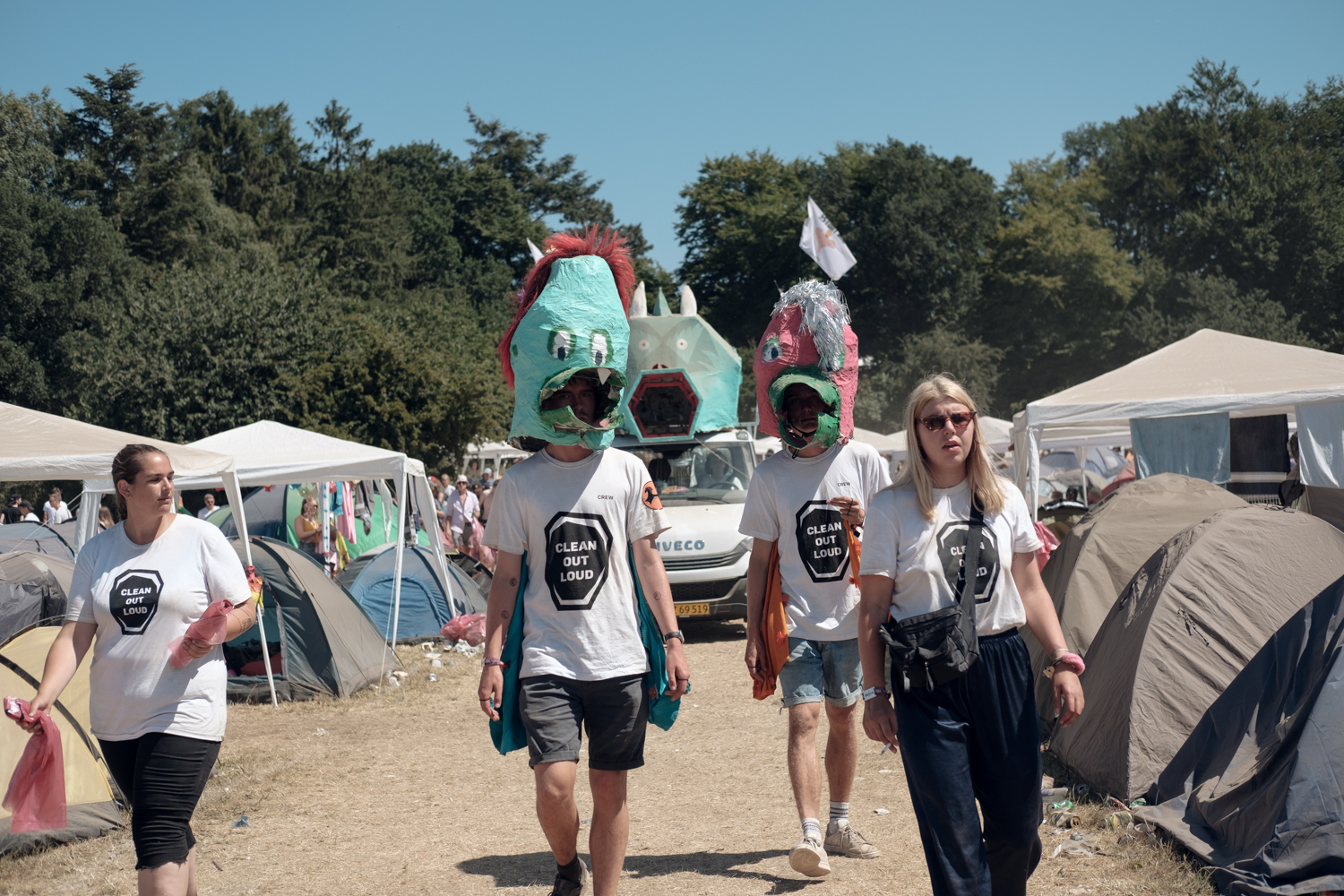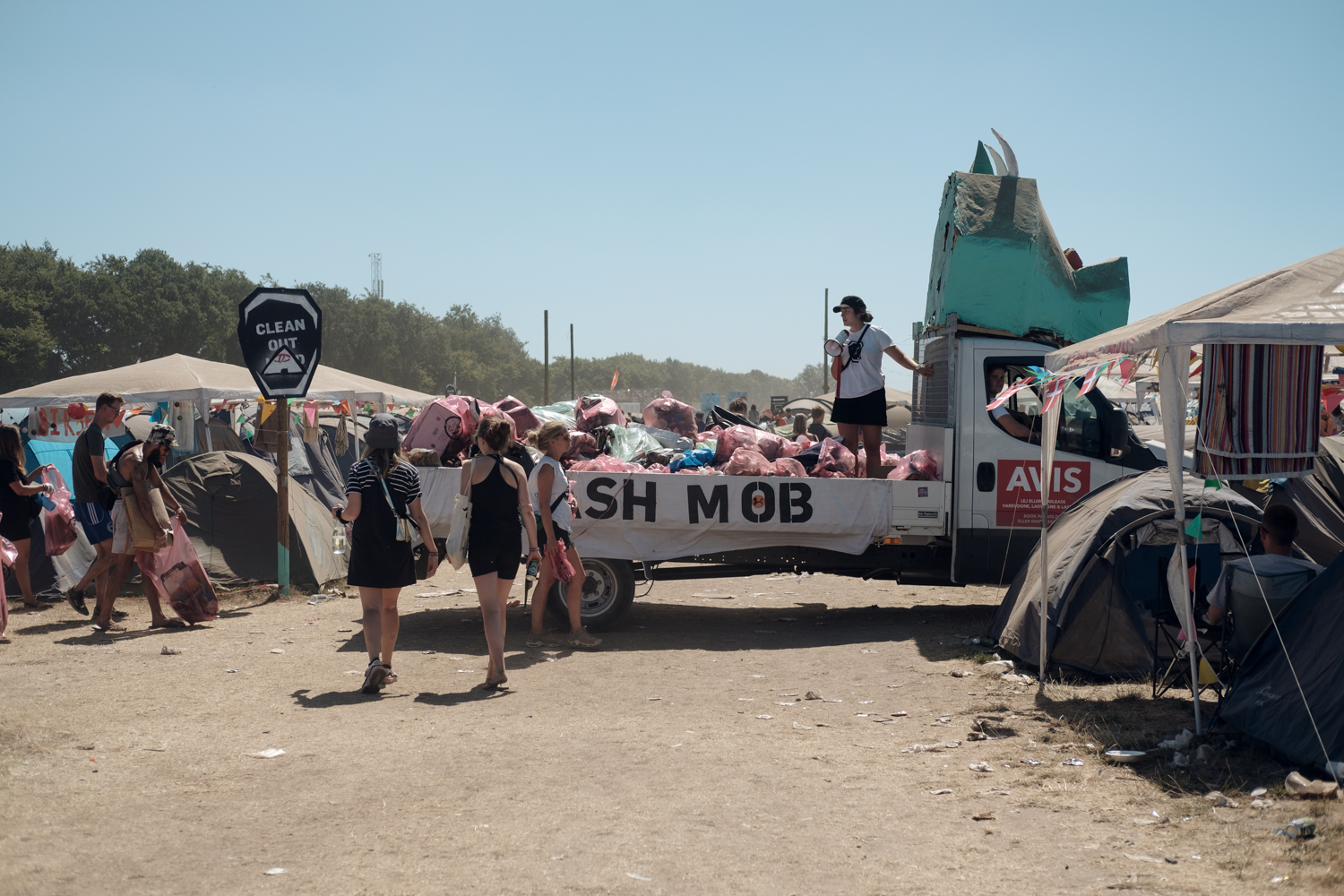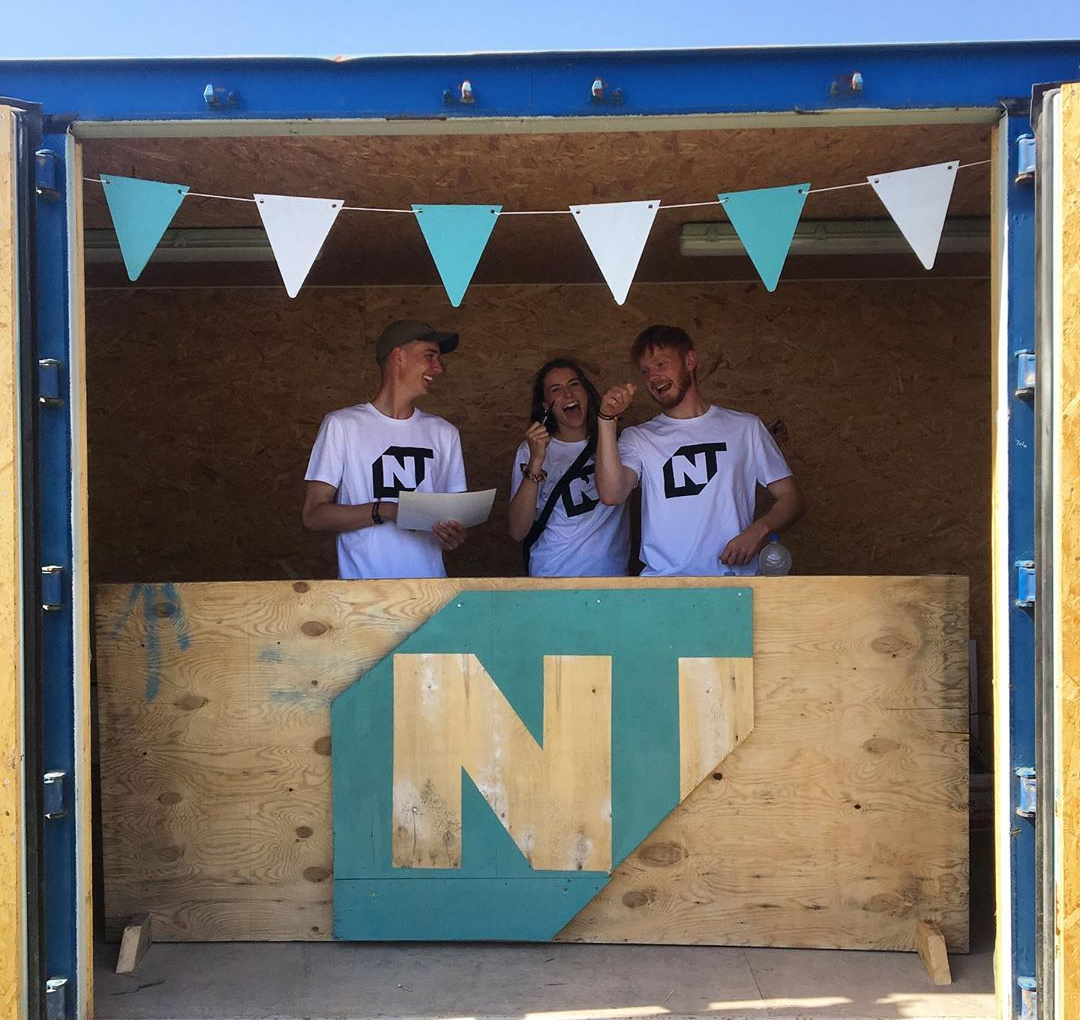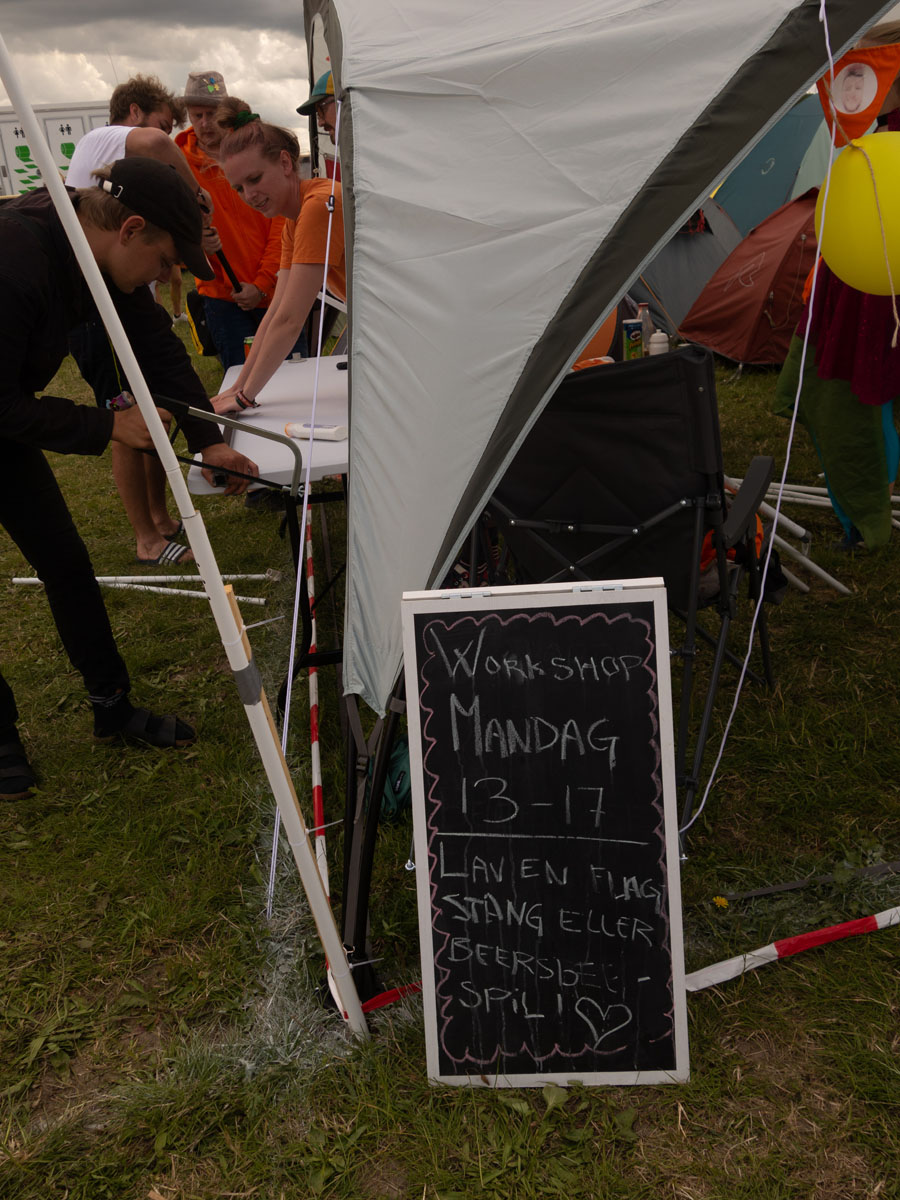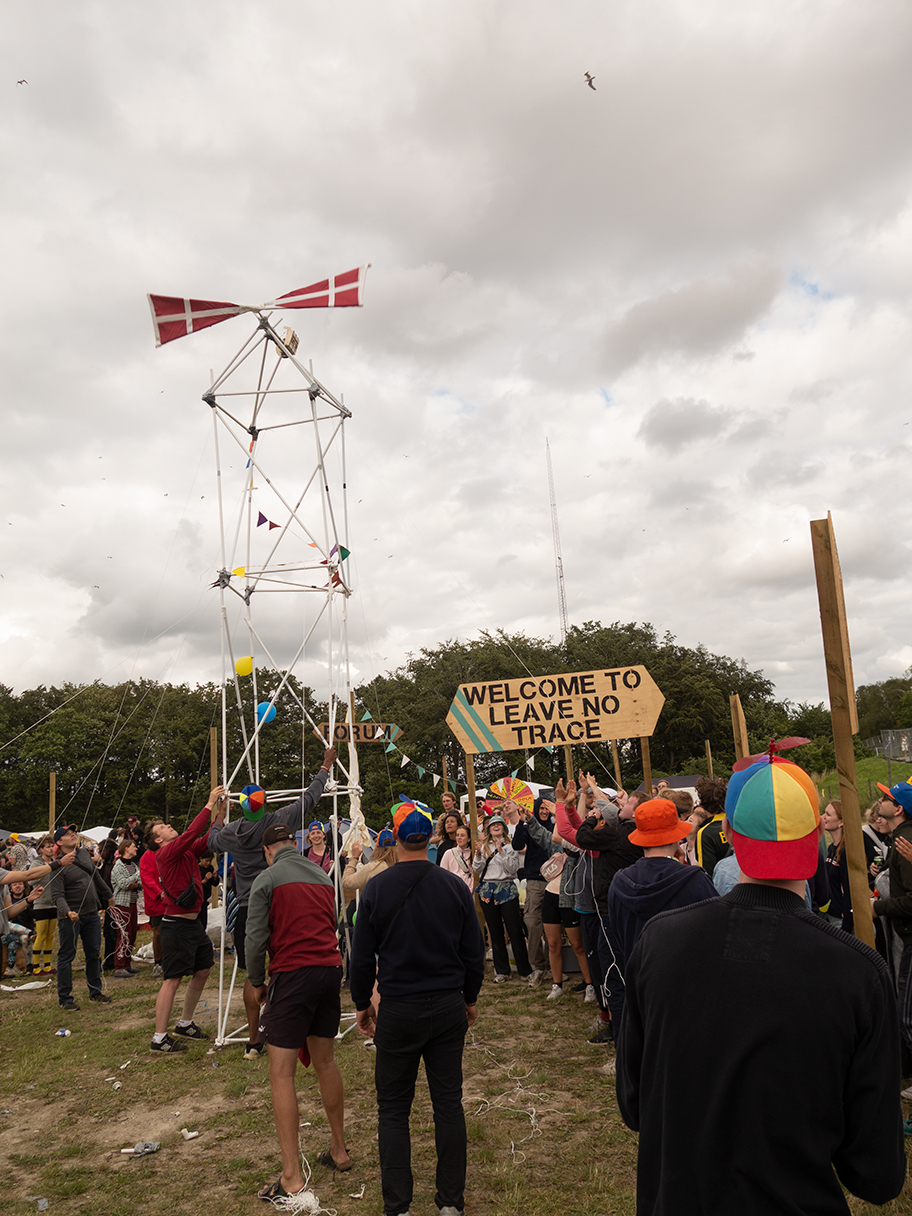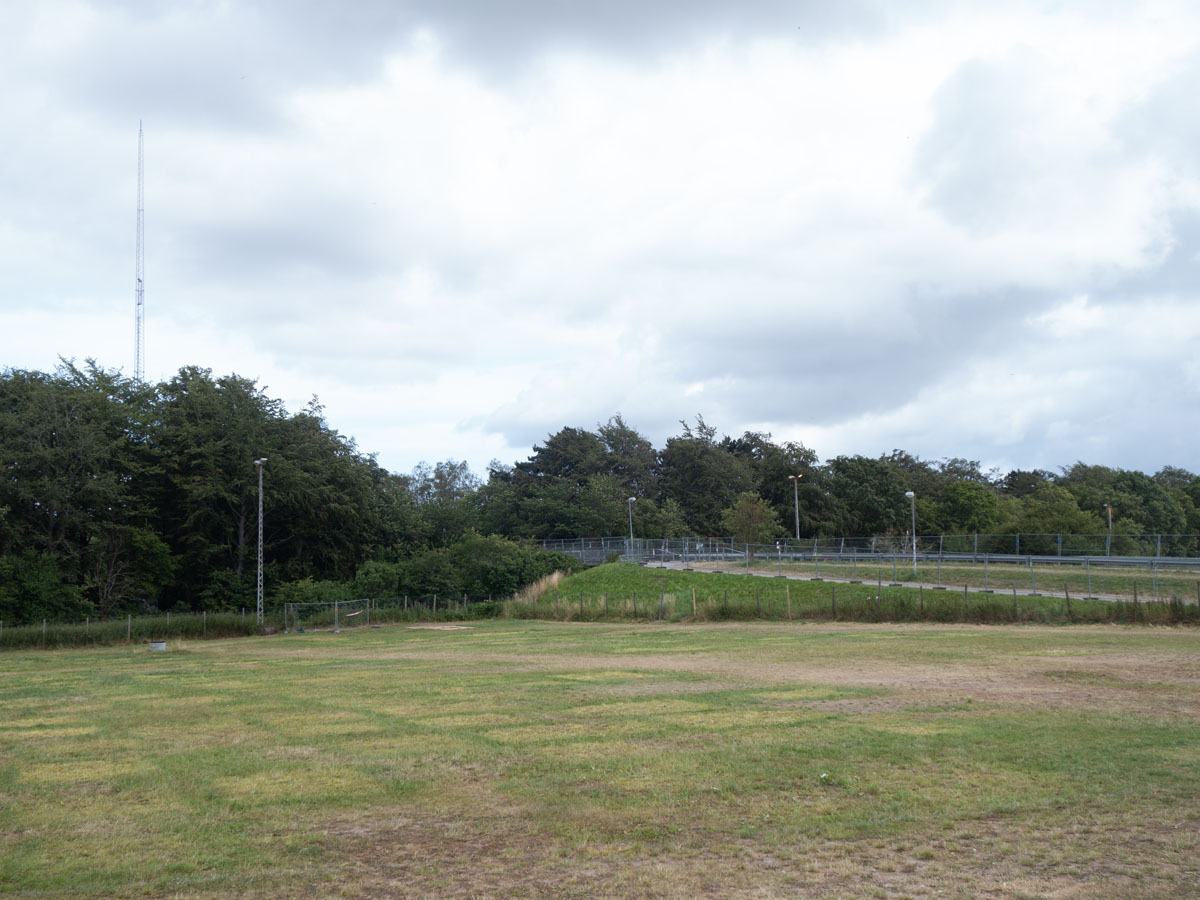text Jonas Rogge
redaktion Isabel Roudsarabi
fotos Jonas Rogge, Ida Anine, Till Petersen
The Leave no Trace is an eco-conscious camping sector on the huge grounds of Roskilde Festival. It was created by a group of friends and fans of Roskilde. The project is meant to be a space for experimentation, an innovation hub for the future of a sustainable festival experience. We spoke to the makers about their ambitions, once before and once after the festival.
An assumption: Most of us, on a daily basis, do things that we actually consider to be wrong. Be it ordering a shawarma-sandwich, which sounds more exotic than a hamburger, but quite probably doesn't consist of meat from the regional organic farm either, or having your bank account at a conventional bank, because, duh, they do finance arms deals with your money. Whoever has made their peace with the defence industry as well as factory farming, this text does not intend to change your mind – I am not making moral arguments here. This text is concerned with the circumstance that people who do consider these things to be wrong, still do them. The interesting question is: Under which circumstances does this change?
At a festival like Roskilde (RF) a relatively small number of workers and volunteers is confronted with the waste left behind by the enormous number of 130.000 visitors, camping and partying on the field next to a small danish town for a full week. It is an extensive amount of trash, that takes days to collect and remove from the camping grounds. Most of the visitors have long fled the festival at this point. As the way home is not far for many of the guests (Copenhagen e.g. is just 30 mins by train), a lot of them already leave Saturday night after the last concerts.
Festival-torn from 8 days of warm beers and collective wildness, they leave everything behind, from food leftovers to extra pairs of shoes and big, completely intact tents. According to the RF, this camping ground waste constitutes 75 % of the total volume of 2,2 thousand tons of trash that the festival produces. At this point it is too late for recycling, the biggest part of the waste gets transported to the next incineration plant.
Another assumption: Many of the people leaving all their stuff behind at RF or any other festival, would not defend their behaviour as being totally cool and unproblematic, if they were questioned about it. Also for the people of the Roskilde society it is an interesting question - how can you communicate such a simple truth as “It is not cool, to just leave your trash lying on a green field (let alone burning it, see RF-history)”, in an effective way? In a way that makes people actually change their behaviour.
Roskilde does bother with finding an answer to that question. Initiatives aiming at a more conscious handling of the waste reach from poster-campaigns, over upcycling workshops to the installation of recycling stations on the camping and finally, the support of ecologically oriented theme camps.
One of these projects is the “Clean out Loud” (CoL). Since its start in 2011 it has achieved that now, in 2019 over 10.000 campers have signed up to live in this area, where they commit to a) cleaning up after themselves, and b) participating in actions promoting eco-consciousness, for example, the colourful and noisy trash parades moving over the camping grounds and motivating people to dispose of their waste. The CoL quite probably plays the biggest role in a slow transition at RF, from burning wastelands to a field that is showing more and more green spots after the festival, year after year.
Another project, ambitious to play a part in this development, evolving from the idea of CoL, is the “Leave no Trace” camp. Not leaving any waste behind, is just the most basic common ground for the people that decide to stay there. Last year, we set out to meet the makers and come to know why another eco-camp is needed at RF, and how it feels to be responsible for it.
“For some reasons domes are very popular this year.” (Before the Festival)
I first encounter the young initiative three days before the start of RF 2019. On this Wednesday the scenery at the north end of the “Camping West” is hardly impressing. About a dozen of young folks are in the process of unloading a shipping container. Poles and boards are spread out on the grass, some begin to paint the boards. They are starting to construct the basic structure of the “Forum” - the space that is soon going to be something like the village square of the LNT area. As Johan was just about to ask his colleague Mathilde for further tasks, he is happy to introduce me to their project.
Can you tell me your name and where you come from?
Johan: My name is Johan, I live in Copenhagen, Refshaleøen. I've been here for two days now, I slept at home though.
You live in Refshaleøen (former industrial port island), do you live on a boat?
J: No, I live in a container home in a new student housing project, where you can apply for a home and live in a small community, with a little more than 150 people. It's super nice, a really good place just next to the water, so you swim every morning.
Anyway, now we are at a space that is going to be the Leave no Trace area during the festival. Can you tell us what this is about?
J: At LNT we are trying to be the most sustainable camping area at Roskilde festival. Everyone who lives here, has applied. They explain their concepts for their camp and why we should let them live in this area. Then we choose the best ideas.
So there is more people applying for it than there is space?
J: There is. Actually, this is the second year of LNT and we expanded. When we agreed with RF, it wasn't exactly clear how big the area was going to be. In the end we got to let more people in than we first agreed on. Last year it was 700 people living here, this year there will be 1200, that's very nice.
And you are part of the core crew?
J: Yes, this year I've been working on LNT since February already. First of we started doing an application form. After receiving the applications, we've been reading them and texting back and forth for a long time. At other places in Roskilde you'll apply and you just get a yes or a no. Here it is more like a process. If people have some good ideas, we say something like 'This sounds very interesting, can we go more into that or can you work a little bit more with this part of the idea?' We might write a lot of mails with all the camp members, mailing, mailing, mailing - a lot of office work.
And you are just doing that voluntarily?
J: Yeah, that's voluntarily. The group who is working on this project, we are all friends that used to go to the same school. It is a way to get together for us.
Did you also come up with the idea for the project?
J: Not me, personally. But the group, yes. Have you heard about Clean out Loud (CoL)? It's actually a sister project of that. Some of us used to do CoL. Then we wanted to do something even more sustainable and raise the bar for what you can do in this field. Because in CoL a lot of people have cool ideas, but because it is so big, it is more complicated to comply with the safety regulations. That was the motivation for doing this.
Did you meet any of this year's campers yet?
J: No, only through texting. So, today in an hour or two the first people will come and they are going to build a big wheel of Fortune. That is going to be over there. Tomorrow we will have a few camps coming that want to build domes - for some reason domes are very popular this year. We planned all the domes in one line here. So when you walk by, you can see the skyline of LNT.
Are there a lot of new ideas compared to last year?
J: A lot of the people who lived here last year will be here again this year. That's very nice. But new participators are bringing new ideas. We have a camp that is planting eatable mushrooms during the week. I think they started before the festival, but they will bring their plantation. Another camp will be having this windmill in the middle of the camp. Also a lot of camps are doing events. I am especially looking forward to that.
We didn't expect that everyone actually would take home everything, but they did.
Did you go to RF before and have you been part of the destruction?
J: No, I think I am too concerned about the money. I used to be the one looking for useful stuff at the end. Even one year, me and my brother, we borrowed our parents' car, just drove down here, filled it up with old, warm beers, all the vodka we could find, tents and more.
It's crazy. What is worth thousands of Kroners at the start of the festival, is worth nothing in the end.
This space was empty last year?
J: It was, completely empty. We didn't expect that everyone actually would take home everything, but they did. What is even more nice, is that people didn't just clean up the place, they also took home all their camping equipment. It is nice to have people cleaning up, but this is also about motivating them to take home the equipment and use it again next year.
Will it still be loud here? Are sound systems allowed?
J: Yes, plus the Rising scene (an on-camping concert stage open during the warm-up days) is just over there. Last year there was one camp, just next to the meeting area, who had that huge speaker set just powered by solar panels. The thing is, some people think that LNT isn't about partying, but it is just about partying in a good way. Some people wrote in the assignment: 'If it is ok with you, we would like to bring a speaker system'. And we were like 'Yes, please, come on.' We need to party.
It is a problem that festival guests think partying and sustainability can not get along well. But we are trying to prove that they easily can.
Mathilde joins us.
Mathilde, you as the scenographer, how much is the festival involved in the development of LNT?
M: We designed the area all by ourselves, the festival doesn't have any say in this.
What about the program of the activities here?
M: The only thing we need from the festival's side is the basic infrastructure: a space, a power connection and getting those holes for the poles made.
We also talk to people about which products they bring to a festival.
Does the festival provide the construction material?
M: No, we bought all of this. I was in charge of buying all the materials. Much of the materials we got for free, because we've gone out to places and said 'Hey, please, can we have some of this for our project' and you know...
What are you doing outside of the festival world?
M: I am working in 2 stores, clothing stores in Copenhagen, because I want to become a textile designer. LNT I just do for fun.
You just finished painting the boards. What do they show?
M: They are about the 3 focuses: nourishment, upcycling and energy. These are our three main topics and every camp that lives here, has to choose one of these.
What do you think is the biggest difference between Clean out Loud and Leave no Trace?
M: It is the fact that we are more sustainable. In CoL we only remove the trash and make sure, that there is nothing left when we leave. We also do that here, but we also talk to people about which products they bring to a festival. They have to be more durable and have a longer living time. We try to upcycle and reuse and yeah, that's the big difference.
Are you enjoying the preparation days so far?
M: Definitely. I've been here every day since Monday, it's fun. It's what we have been waiting for for half a year. We started in January with the plans and now we are working, finally.
Impressionen - LNT 2019
“Hopefully, in a few years, you have to sign up for the trashy camping.” (After the Festival)
Over a week later - it is early afternoon on the Sunday after the festival. Approaching the LNT area, little if anything hints at what had happened here the past week. Only a group of some 25 young people gathers around a shipping container, chatting. Visiting the place during the festival, I had seen people constructing a giant wind mill out of old pavilion poles, pavilion domes made of wood and textiles, sound systems being powered by solar panels – but mostly, people having a good time, dancing, drinking and playing games, often in the wide open space of the “Forum”. The invitation to the campers to gather and not keep their parties to themselves, had clearly worked out.
Now the LNT is just a vast green field. Magically, everything, all the infrastructure, all the tents and pavilions, have disappeared over night.
How did everything disappear so fast?
J: We started this morning. The first camps packed their stuff and went home yesterday. Now we are done and it's 4 pm, that's really nice. We made it in one day, less than one day actually.
Did you have any camps that were misbehaving, leaving stuff behind?
J: All of them took home their camping equipment and almost everyone even took all the small parts, cigarette butts for example. It was so clean, very beautiful. A few camps took their gear home, but they needed a last round of cleaning up. But still, it was very fine.
I am quite satisfied, a bit proud as well.
Have you been to the Eastside?
J: Yeah, I just drove by. It was totally crazy, maybe like the end of the world or something. Compared to that, this is amazing. If you haven't been here in the days before, you wouldn't guess that this was Roskilde Festival yesterday or even this morning. I am quite satisfied, a bit as well. Look at the team, they are all so tired. All laying down, sleeping. So in ten minutes we'll have pizzas and then we're over and out.
Going home?
J: Yeah. At the end of the week we'll meet up and talk about how everything went out, talk about the camps, look at the pictures.
How was it when the campers arrived, do you remember?
J: It was really cool. In the last few months I was writing so many mails, and to finally see them and their ideas become reality... That was super, it was amazing. All the hard work paying off and seeing people being happy.
What was your highlight from the camps?
J: I remember one day at Forum. If people wanted to do an event, we recommended them to do it there, so everybody will feel welcome. One day I went down there and I think 3 or 4 different events were happening at the same time and it all merged together. There was this party, it was about dancing and drinking beer from a bong. On the other side there was some people that wanted to promote eating vegan. On this day they supplied everyone who wanted with some vegan food. So all the partying people just went over there, got the food and danced around with the it. At the same time some people were building one big wind mill from leftover poles and sticks. All at the same time and everyone was having a good time. It was so nice. I don't think I could imagine that when we were preparing all this. I'll remember that for a long time.
I didn't expect that, but walking into their camp you are really pushing some limits.
Were there also ideas that didn't work out?
J: I believe so. When people are planning, they have a lot of great ideas. When they finally have to do it, then some might just not work out as good as expected and others didn't even get to start the project. But overall, I think it was a great success. Also we had two camps who, when they applied, were planning with 20 people. Then, few weeks before, they wrote us, 'Unfortunately we are only 3.' Another camp said they are only 5 people. I don't know how, but they found out that they should live together. So two groups who didn't know each other before this, made a camp together. That was really nice - that's Roskilde spirit.
Was it strange to be in a kind of authority position here? How does it feel to be responsible for the area?
J: In the end of the week, we teamed up a few people, walking around all the camps. Most people were just hanging out and everything was very nice. Some camps, if it was too trashy, we went into their camps and tried to motivate them to clean up. Because if it is too trashy, the last day when they are all hung over, they might not clean up after themselves. That situation was... I didn't expect that, but walking into their camp you are really pushing some limits, crossing a line. That was a little strange, but luckily most of them were very kind when you got in there. Especially when you wear the white shirt with the logo on, I think when you walk in the camp they feel like a kid in the school, who is about to meet the teacher.
Do you think people here need the teacher?
J: I mean, maybe we had to talk to 3-5 camps and they all cleaned up. We had 70 camps in total, the rest didn't even needed to be talked to. I hope next year this will be even bigger and in ten years the normal camping will be this small area that you have to apply for. Then you have to apply for the trashy camping (laughs). Hopefully. When I biked through the East, it was total trash, but here and there you saw that people took home their equipment. Actually we talked to the leader of the area down there and she said there were more clean spots than usually. I believe that something is happening.


